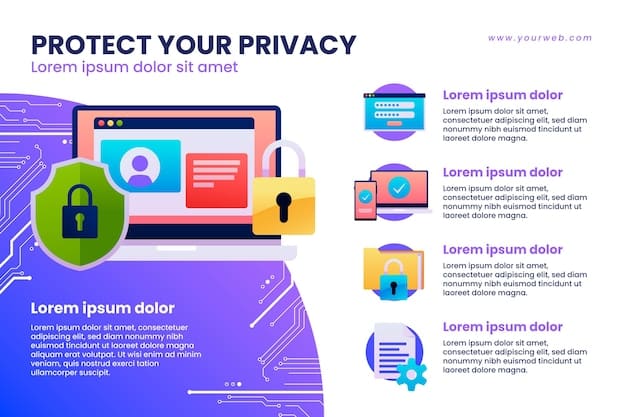Data Privacy Under Attack: Know Your Rights Amid New Violations Report

Breaking: New Report Exposes Widespread Data Privacy Violations – What Are Your Rights? The recent report highlights significant breaches of data privacy, impacting individuals across the US. Understanding your rights and taking proactive measures is crucial in protecting your personal information from misuse and unauthorized access.
A concerning new report has surfaced, revealing widespread data privacy violations impacting countless individuals. As we navigate this digital age, understanding your rights becomes paramount. This article delves into the findings of this report, outlining what you need to know to protect yourself and your data in the face of these breaches. Are you aware of your rights when your personal information is compromised? Let’s explore.
Understanding the Data Privacy Crisis Unveiled
The digital landscape is constantly evolving, and with it, the challenges to data privacy have become increasingly complex. A new report sheds light on the extent of these challenges, detailing widespread violations that impact individuals daily. Understanding the nature of these violations is the first step in reclaiming control over your personal information.
The Alarming Findings of the Report
The report highlights several key areas where data privacy is being compromised. These include unauthorized data collection, inadequate security measures, and the misuse of personal information by companies and organizations. These findings raise serious concerns about the current state of data protection practices.
Who is Affected by These Violations?
The violations don’t discriminate. From social media users to online shoppers, from healthcare patients to banking customers, virtually everyone who interacts with digital platforms is potentially at risk. The scope and scale of these breaches are truly alarming, affecting a broad spectrum of the population.

- Lack of Transparency: Many companies fail to inform users adequately about how their data is being collected and used.
- Inadequate Security: Weak security measures make it easier for hackers to access and steal personal information.
- Misuse of Data: Some organizations use personal data for purposes beyond what users have consented to, such as targeted advertising or profiling.
The report paints a grim picture of the current data privacy landscape, emphasizing the urgent need for stronger regulations and greater awareness among individuals. As the digital age continues to advance, it’s more important than ever to understand the risks and take proactive steps to protect your personal information.
Your Fundamental Rights Regarding Data Privacy
Knowing your rights is the first line of defense against data privacy violations. In the US, various laws and regulations are in place to protect your personal information. Understanding these rights will empower you to take action when your privacy is compromised.
CCPA and CPRA: California’s Leading the Way
The California Consumer Privacy Act (CCPA) and the California Privacy Rights Act (CPRA) are among the most comprehensive data privacy laws in the US. These laws grant California residents significant rights over their personal data, including the right to know what data is being collected, the right to deletion, and the right to opt-out of the sale of personal information.
Other State and Federal Laws Protecting Your Data
Beyond California, other states are also enacting their own data privacy laws. Additionally, federal laws such as the Health Insurance Portability and Accountability Act (HIPAA) and the Children’s Online Privacy Protection Act (COPPA) provide specific protections for health information and children’s data, respectively.
- Right to Access: You have the right to know what personal data a company holds about you.
- Right to Correction: You can request that inaccurate or incomplete data be corrected.
- Right to Deletion: In many cases, you can request that your personal data be deleted.
- Right to Opt-Out: You have the right to opt-out of the sale of your personal information.
Being aware of these rights and the laws that protect them is crucial for protecting your data privacy. By understanding your entitlements, you can hold companies accountable and take appropriate action when your rights are violated.
Practical Steps to Safeguard Your Personal Data
While understanding your rights is essential, taking practical steps to protect your data is equally important. There are several measures you can take to reduce your risk of falling victim to data privacy violations. These steps range from simple online habits to more proactive approaches.
Strengthening Your Online Security
Start by strengthening your online security practices. Use strong, unique passwords for each of your online accounts. Enable two-factor authentication whenever possible. Be cautious about clicking on suspicious links or downloading attachments from unknown sources.
Reviewing and Adjusting Privacy Settings
Take the time to review and adjust the privacy settings on your social media accounts, apps, and other online services. Limit the amount of personal information you share and control who has access to your data.

- Use Strong Passwords: A combination of uppercase and lowercase letters, numbers, and symbols.
- Enable Two-Factor Authentication: Adds an extra layer of security to your accounts.
- Be Careful What You Share: Limit the personal information you post online.
- Review Privacy Policies: Understand how companies collect and use your data.
Taking these practical steps can significantly reduce your risk of data privacy violations. By implementing strong security measures and being mindful of your online behavior, you can take control of your personal information and protect yourself from potential harm.
How to Respond to a Data Breach: A Step-by-Step Guide
Despite your best efforts, data breaches can still occur. Knowing how to respond effectively is crucial in mitigating the potential damage. Here’s a step-by-step guide on what to do if you suspect your data has been compromised.
Immediate Actions to Take
If you receive a notification of a data breach or suspect your information has been compromised, take immediate action. Change your passwords for all affected accounts and monitor your credit report for any signs of identity theft.
Reporting the Breach to Authorities
Consider reporting the breach to the Federal Trade Commission (FTC) or your state’s Attorney General. Providing details about the breach can help authorities investigate and take appropriate action against the responsible parties.
Understanding Your Notification Rights
Data breach notification laws require companies to inform individuals when their personal information has been compromised. Understanding your notification rights ensures you receive timely and accurate information about the breach and the steps you can take to protect yourself.
The Role of Government and Industry in Protecting Data Privacy
While individual actions are important, protecting data privacy requires a collective effort from both the government and industry. Stronger regulations and industry best practices are essential for creating a safer digital environment.
Government has a crucial role in enacting and enforcing data privacy laws. This includes setting clear standards for data collection, use, and protection, as well as holding companies accountable for violating these standards.
Industry must also take responsibility for protecting user data. This includes implementing robust security measures, being transparent about data practices, and respecting user privacy rights. Companies that prioritize data privacy can build trust with their customers and gain a competitive advantage.
Looking Ahead: The Future of Data Privacy in the US
The future of data privacy in the US is uncertain, but several trends and developments suggest a growing emphasis on individual rights and data protection. As technology continues to evolve, it’s essential to stay informed and advocate for policies that prioritize data privacy.
Emerging Trends in Data Privacy
One emerging trend is the rise of privacy-enhancing technologies, such as encryption and anonymization, which can help protect personal data from unauthorized access. Additionally, there is a growing movement towards data minimization, which involves collecting only the data that is strictly necessary for a specific purpose.
Advocating for Stronger Data Protection Laws
Advocating for stronger data protection laws is crucial for ensuring that individuals have meaningful control over their personal information. This includes supporting legislation that grants individuals greater rights over their data, as well as holding companies accountable for data breaches and privacy violations.
| Key Aspect | Brief Description |
|---|---|
| 🛡️ Data Privacy Rights | Knowing your rights is crucial for protecting personal data. |
| 🔒 Online Security Tips | Strengthen passwords and enable two-factor authentication. |
| 🚨 Data Breach Response | Steps to take if your data has been compromised. |
| 🏛️ Government & Industry Roles | Importance of regulations and ethical practices. |
Frequently Asked Questions (FAQ)
▼
Immediately change your passwords for affected accounts, monitor your credit report, and report the breach to authorities like the FTC.
▼
Use a combination of uppercase and lowercase letters, numbers, and symbols. Avoid using personal information or common words.
▼
Two-factor authentication adds an extra layer of security by requiring a second verification method, such as a code sent to your phone.
▼
Yes, such as the California Consumer Privacy Act (CCPA), the California Privacy Rights Act (CPRA), HIPAA, and COPPA.
▼
Companies should clearly explain data collection and usage in their privacy policies and provide users with control over their data.
Conclusion
In conclusion, the recent report exposing widespread **Breaking: New Report Exposes Widespread Data Privacy Violations – What Are Your Rights?** emphasizes the urgent need for individuals to understand and protect their data. By knowing your rights, taking practical security measures, and advocating for stronger data protection laws, you can navigate the digital landscape more safely and confidently.





